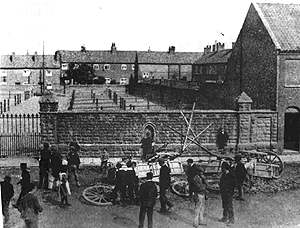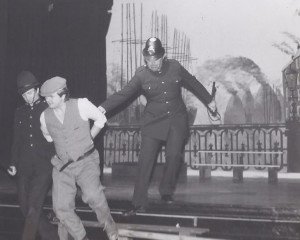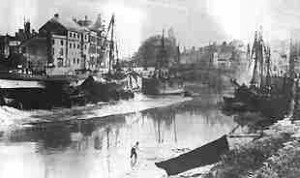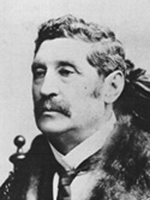
Bridgwater is a town with a radical and interesting history. The Battle of Sedgemoor, the petition against the Slave trade, the Siege during the civil war have all gone down in history. But on this day – July 2nd – in 1896 the town was literally a riot.
During the 19th century the chief industry of Bridgwater was brickmaking and the town was dominated by tall brick kiln chimneys mingling with the high masts from the ocean going sailing ships that harboured as far inland as the town bridge. The work in the brickyards was hot, dirty,dangerous and labour intensive with brickworkers even wearing string around their knees to stop rats running up their legs along the river banks.
In 1896 relations between workers and brickyard owners boiled over into confrontation and a strike broke out all across the town on 29th May with pickets across the town at all brickyard entrances, mass meetings of strikers on the ‘Rec ‘ (modern day Cranleigh Gardens) and marches through the town with the workers flying their Trade Union banners. The workers were demanding 6 pence a day increase and a half day less on saturdays .
Strike
Whilst the strike was solid so was the determination of the bosses not to give up any of their profits so they sat back and left it to the Borough Council to deal with any consequences of the strike. The Mayor (Henry Pollard) and his ‘Watch Committee’ – so called because they kept a ‘watch’ on law and order and the emergency services – were not convinced they could control 2,000 angry and frustrated strikers and made secret plans to bring in the military. Already the Tory Government of Lord Salisbury had used the army in action in Wales and Yorkshire against Miners with some fatalities but now the Town Council were seriously considering it on the people who (probably hadn’t) elected them.

In this atmosphere of escalating tension the strikers stepped up their direct action and started to seize scab brick carts en route to the brickyards taking it into their own hands to stop all movement of bricks and tiles. On July 1st strikers seized 2 carts and took them to the Cattle market – present day the land next to the cinema on Penel Orlieu. The brickyard owners were apoplectic with rage – but at the same time knew they had the resources of the state behind them and demanded from the Council and the Chief of Police that the carts be returned. What had made things worse was that the strikers had in fact overpowered Police escorts to the carts at St John street and at West Bow crossroads. Now virtually the entire available Police force from around Somerset was sent to Bridgwater.
Riot
Tension mounted as the hot summer day turned to hot summer evening when at 7pm 108 soldiers of the Gloucestershire Regiment, previously on their way to active service in South Africa, arrived at the railway station kitted out in Zulu war period tunics and pith helmets, and marched to the town hall getting a hostile reception from the towns people.
The Town Hall was now filled with Police and Soldiers giving the Mayor and the chief of Police the confidence to try to regain the carts by force and at 9pm made a baton charge from High street into Penel Orlieu. Striking Brickworkers at once uptipped the carts forming barricades and fought them off by weight of numbers (and flying bricks) sending them back into the Town Hall where the ruling class sat surrounded by the working class. Who now started to throw bricks through the windows….

After 6 hours of siege Mayor Henry Pollard and town clerk William Brice appeared at the door of the town hall and read the riot act to the strikers. At once the military appeared with fixed bayonets and proceeded to charge up and down the High street clearing the strikers from the streets. One of the first casualties was a young novice female reporter for the local newspaper who was badly beaten in the initial assault.
The first target of the troops was the armoury in Friarn street where the Mayor feared the strikers would head for to acquire weapons themselves. In fact they hadn’t thought of it and were too busy running for their lives .

On this night in Bridgwater history 27 people were arrested and subsequently charged on riot related offences and the town was occupied by the redcoated military – an event depicted today by the banner of the Bridgwater Trades Union Council.
A photograph of the occupation is on display in the Charter Hall of Bridgwater Town Hall.
